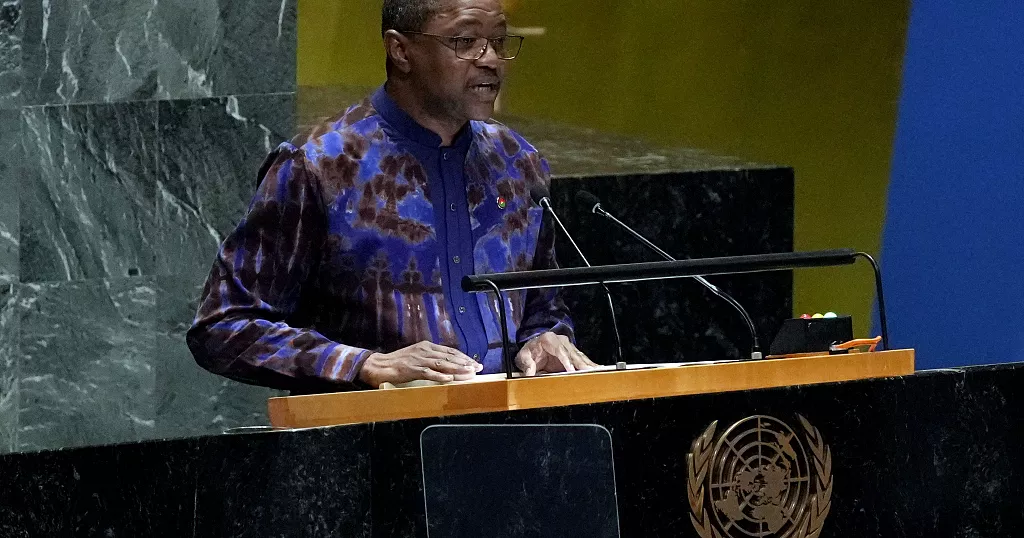Burkina Faso Criticizes Foreign Interference Amid Ongoing Struggles in the Sahel
3 min read
Burkina Faso Foreign Minister Karamoko Jean Marie Traore addresses the 79th session of the United Nations General Assembly, on Sept. 30, 2024.

Burkina Faso Foreign Minister Karamoko Jean Marie Traore addresses the 79th session of the United Nations General Assembly, on Sept. 30, 2024.
Burkina Faso’s Minister of Foreign Affairs, Karamoko Jean Marie Traore, addressed the UN General Assembly’s High-Level Debate on Monday, calling out foreign powers for their role in exacerbating the suffering of Sahelians amid ongoing security challenges. As Burkina Faso battles a terrorist group in its northeastern region, Traore emphasized that the country has managed to regain control of nearly 70% of its territory, a significant increase from just 40% in 2022.
In his address, Traore also defended the Burkinabe Defense and Security Forces (FDS) against what he described as damaging propaganda aimed at undermining their efforts. He praised their professionalism and commitment, particularly highlighting their participation in international peacekeeping operations. “The ongoing training and examination of our defense forces and volunteers in international humanitarian law ensure that our professional conduct is beyond reproach in respecting human rights,” he stated.
Addressing the broader context of insecurity in the Sahel, Traore criticized foreign nations that he accused of financing and supporting terrorism in the region. He specifically pointed to what he sees as a deliberate strategy by these powers to increase the suffering of local populations. “The Alliance of Sahel States (AES) was created to protect the people of the Sahel who have been caught in the crossfire of security and humanitarian crises,” he explained.
Traore reiterated accusations against Ukraine, labeling it a “sponsor” of terrorism in the Sahel. This claim reflects the complex geopolitical dynamics at play in the region, where local grievances often intersect with broader international conflicts. He emphasized the growing public support for the AES, attributing it partly to the perceived failures of sub-regional institutions to adequately address the legitimate security concerns of the people.
“The establishment of the Alliance has been lifesaving and will be our salvation,” Traore asserted. He stressed the importance of the AES in safeguarding communities that have faced violent measures which he claimed were designed to further exacerbate their plight. This statement underscores the urgent need for effective governance and security solutions tailored to the unique challenges of the Sahel region.
Traore also called for action from the UN Security Council, noting that the AES had submitted appeals last August and was awaiting “strong decisions” to support their efforts. His remarks highlight the frustrations of African nations regarding the perceived inadequacy of international responses to regional crises.
In a broader context, the foreign minister extended Burkina Faso’s support for reforming the UN Security Council to better represent African interests. “Such reforms would allow us to establish the universal character of the UN and address the persistent injustices faced by Africa,” he concluded.
As Burkina Faso navigates a precarious security landscape, the government’s narrative is clear: it seeks to assert its sovereignty while condemning foreign interference that it views as counterproductive to peace and stability in the region. The minister’s address reflects a growing sentiment among Sahelian nations, advocating for greater autonomy in addressing their own security challenges without external influence.
The struggle against terrorism in the Sahel is complicated by factors such as poverty, political instability, and the impact of climate change. As the region grapples with these interconnected issues, the call for solidarity among Sahelian states becomes increasingly vital. The AES aims to foster a collaborative approach to address these challenges, although the success of such initiatives depends heavily on international support and the resolution of underlying grievances.
Ultimately, Burkina Faso’s stance at the UN highlights a critical juncture for the Sahel region. As nations band together to confront the shared threat of terrorism, they also seek recognition and respect on the global stage, advocating for a future where their voices are heard and their needs addressed. The path ahead may be fraught with difficulties, but the commitment to collective security and national integrity remains steadfast among the Sahel’s leaders.